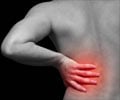People with symptoms of depression are likely to have back pain, reveals a new study. The results showed a significant association between symptoms of depression and low back pain.

On analysis of twin pairs, which controls for genetic and familial factors that could influence the relationship between depression and back pain, the relationship remained significant, with a 1.7 increase in odds. The association was even stronger, more than a 2.3 increase in odds of low back pain associated with depression and anxiety, on analysis of dizygotic (non-identical) twins, who share half their genes.
On further analysis of monozygotic twins, who are genetically identical-the association between symptoms of depression and low back pain disappeared. This suggested that the strong association found in non-identical twins resulted from the "confounding" effects of common genetic factors influencing both conditions. For example, genes affecting levels of neurotransmitters such as serotonin and norepinephrine might affect the risk of both conditions.
Previous studies have shown a "consistent relationship" between back pain and depression, a combination that might complicate diagnosis and treatment. However, the nature of the association remains unclear. The new study was the first to examine the relationship between depression and low back pain using twin data to control for genetic and familial factors.
The finding that the association disappears after fully adjusting for genetics and familial confounders in identical twins suggests that "genetics was the main confounder" of the relationship between depression and back pain. Thus the commonly found association between these health conditions was probably not a true relationship, as there are other factors influencing it.
The study is published in the journal PAIN(r), the official publication of the International Association for the Study of Pain.
 MEDINDIA
MEDINDIA




 Email
Email










